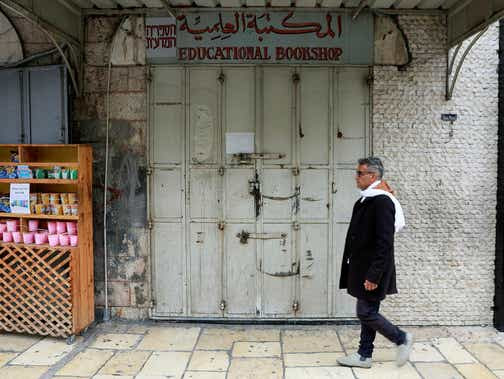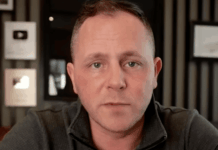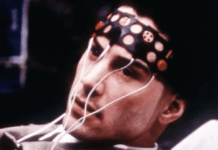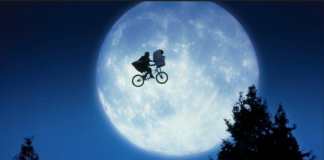by David Issacharoff,
‘We never imagined we would sit in an Israeli jail for selling books’
On Sunday afternoon, Mahmoud and Ahmed Muna were, as usual, selling books at their shop on one of the main roads of East Jerusalem.
Twenty-four hours later, they would be shackled by their hands and feet in the Jerusalem District Court, only 250 meters from their store.
The Educational Bookshop, opened in 1984, is the most well-known bookstore in East Jerusalem. Specializing in Arabic and English books on the Israeli-Palestinian conflict and the history of Jerusalem, it has become a rare and iconic meeting place for researchers, diplomats, journalists and tourists from all sides. The owners proudly present it as a place where Palestinians and Israelis can mingle and talk: “A space for everyone. We have room for anyone’s opinion, and we don’t always agree, but we can talk about it.”
I remember the first time I visited the shop, with a group of Israeli and Palestinian peace activists. We were hosted by Mahmoud, who made us coffee as we browsed the books. Over the years, it became an essential stop for me whenever I walked around the area. Growing up just a few kilometers from the shop – but a world away, in the Jewish part of Jerusalem – I wasn’t exposed to books like these in my neighborhood stores or libraries.
The bookshop allowed me to page through books on Palestinian identity and culture, from music to food to the history of the land – and on the best-kept secret in Jewish Israeli society: the Nakba, the Palestinian perspective on the 1948 war, whose effects of displacement are still being felt to this day in full force, as the Israel-Hamas war may be winding down.
Murad, the brother of the shop’s owner who also works there, told Haaretz that Israeli police, accompanied by a Shin Bet officer, left books and postcards scattered on the floor, labeling them – along with a copy of Sunday’s Haaretz newspaper, featuring a headline on the previous day’s hostage release – as incitement to terrorism.
“They took every book with a Palestinian flag on it and seized a significant number of books. They also took a coloring book for kids called ‘From the River to the Sea,'” he added.
Three weeks after ultranationalist National Security Minister Itamar Ben-Gvir resigned from the government in protest of the Gaza cease-fire, it seems that the police are still operating very much under his influence. In their statement, the police – without any evidence – labeled the booksellers as inciters and supporters of terror, claiming they pose a “danger” to the citizens of Israel.
Just one kilometer from the shop, in the heart of Jewish Jerusalem, one can find children’s books about building the Third Temple, Jewish settlements and outposts in the West Bank, and glorifying IDF soldiers in the latest war in Gaza. But that erasure of Palestinians has long been part of the state’s ideology: Maps of Israel, literally spanning from the river to the sea, already hang in classrooms across every sector of society.
On a random shelf in the Educational Bookshop, one can find a book by Israeli author Nir Baram, “A Land Without Borders,” describing his impressions of the West Bank, alongside “Being Palestinian Makes Me Smile” by Palestinian comedian Amer Zahr, or Colum McCann’s novel “Apeirogon,” about a friendship between bereaved Israeli and Palestinian fathers. Why didn’t the police officers confiscate those?
Did they also overlook “The Oxford Handbook of Antisemitism” or “Shalom Inshallah: Encountering Jews, Christians, and Muslims,” a photography book?
Israel’s war is now targeting Palestinian culture along with the Palestinian people. The Jewish people, who have a painful history of being the target of assaults on books and ethnic cleansing, have now fully normalized similar sentiments in a society in which Holocaust memory is still foundational, generations later. According to recent polls, nearly 70 percent of Israelis support U.S. President Donald Trump’s plan to expel the Palestinian population of Gaza.
On Monday, dozens of activists and Jerusalem residents gathered at the store to show solidarity with the family and the business, forming a long line of shoppers. They then followed Murad to the courthouse, standing outside while the booksellers awaited the hearing of their appeal after a night in police custody. The police, realizing they had no case for charging them with incitement to terrorism, instead accused them of “disrupting public order.”
In the Jerusalem courthouse, hurrying to the room where his brother and cousin were being held for their hearing, Murad said that what the police did “doesn’t deter us.”
“We thought there was freedom of speech in Israel. We never imagined in our wildest dreams that we would sit in jail for selling books.”
Source: https://www.haaretz.com
Disclaimer: We at Prepare for Change (PFC) bring you information that is not offered by the mainstream news, and therefore may seem controversial. The opinions, views, statements, and/or information we present are not necessarily promoted, endorsed, espoused, or agreed to by Prepare for Change, its leadership Council, members, those who work with PFC, or those who read its content. However, they are hopefully provocative. Please use discernment! Use logical thinking, your own intuition and your own connection with Source, Spirit and Natural Laws to help you determine what is true and what is not. By sharing information and seeding dialogue, it is our goal to raise consciousness and awareness of higher truths to free us from enslavement of the matrix in this material realm.
 EN
EN FR
FR


























